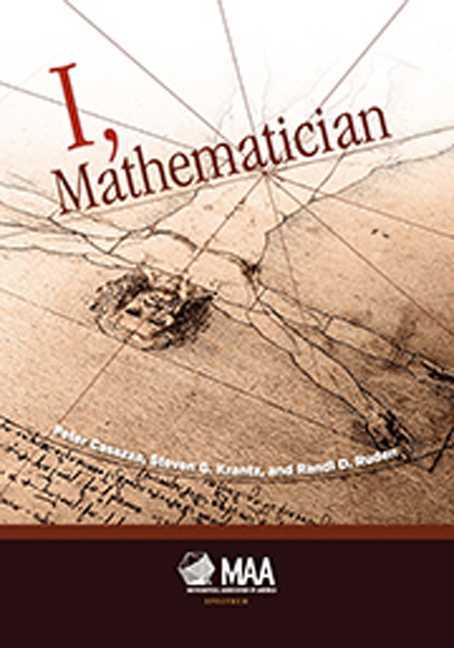Book contents
- Frontmatter
- Contents
- Preface
- Part 1 Who Are Mathematicians?
- Foreword to Who Are Mathematicians?
- 1 Mathematicians and Mathematics
- 2 What Are Mathematicians Really Like? Observations of a Spouse
- 3 Mathematics: Art and Science
- 4 A Mathematician's Survival Guide
- 5 We Are Different
- 6 The Naked Lecturer
- 7 Through a Glass Darkly
- 8 What's a Nice Guy Like Me Doing in a Place Like This?
- 9 A Mathematician's Eye View
- 10 I am a Mathematician
- Part II On Becoming a Mathematician
- Part III Why I Became a Mathematician
10 - I am a Mathematician
from Part 1 - Who Are Mathematicians?
- Frontmatter
- Contents
- Preface
- Part 1 Who Are Mathematicians?
- Foreword to Who Are Mathematicians?
- 1 Mathematicians and Mathematics
- 2 What Are Mathematicians Really Like? Observations of a Spouse
- 3 Mathematics: Art and Science
- 4 A Mathematician's Survival Guide
- 5 We Are Different
- 6 The Naked Lecturer
- 7 Through a Glass Darkly
- 8 What's a Nice Guy Like Me Doing in a Place Like This?
- 9 A Mathematician's Eye View
- 10 I am a Mathematician
- Part II On Becoming a Mathematician
- Part III Why I Became a Mathematician
Summary
Introduction
The title of this piece is exactly the same as Norbert Wiener's famous autobiography [1]. I have chosen it because it summarizes what the editors wanted from me: exactly what is the meaning of this statement, to me, to my colleagues, to the informed scientist, and to the public at large? In the pages to follow I have attempted to present some thoughts in a haphazard and impressionistic manner.
Already in society there is a dichotomy between those who understand to some extent the language of science and have some experience with it, and those who do not. About fifty years ago the British author C. P. Snow discussed this in his 1959 Rede lecture given at Cambridge, U. K., which was later published as a book [2]. The lecture and the book generated intense debate. Snow argued that the widening gap between the humanities and sciences was compromising the ability of the modern society to formulate and solve its problems. He wrote:
A good many times I have been present at gatherings of people who, by the standards of the traditional culture, are thought highly educated and who have with considerable gusto been expressing their incredulity at the illiteracy of scientists. Once or twice I have been provoked and have asked the company how many of them could describe the Second Law of Thermodynamics, the law of entropy. The response was cold: it was also negative. Yet I was asking something which is about the scientific equivalent of: “Have you read a work of Shakespeare's?”
I now believe that if I had asked an even simpler question such as, What do you mean by mass, or acceleration, which is the scientific equivalent of saying, “Can you read?” not more than one in ten of the highly educated would have felt that I was speaking the same language. So the great edifice of modern physics goes up, and the majority of the cleverest people in the western world have about as much insight into it as their Neolithic ancestors would have had.
The result of this dichotomy that Snow highlighted has been that decisions involving vital matters with a huge scientific component like global warming or stem cell research are being made by people who have no scientific training.
- Type
- Chapter
- Information
- I, Mathematician , pp. 112 - 124Publisher: Mathematical Association of AmericaPrint publication year: 2015

